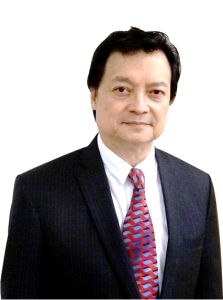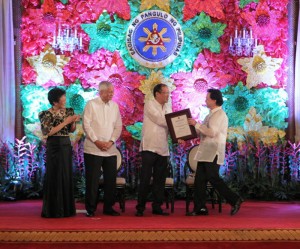What we should know about stem cell treatment in the PH

Doctor-lawyer Samuel Bernal, an expert in regenerative medicine, believes in the true worth of the Filipinos. CONTRIBUTED PHOTO
MANILA, Philippines—In recent years, it’s common to hear beauty doctors in the Philippines offering stem cell therapy as if a new-found medical fountain of youth, the answer to all medical worries.
In various media platform, there are bombardment of advertisements from various hospitals and clinics packaging stem cell therapy as “cure-all” remedy.
With such medical breakthrough, it begs the question on how equipped we are in offering such services. We can’t help but ask the parameters on distinguishing the real experts from seemingly fly-by-night clinics and medical centers.
Filipino-American doctor-lawyer Samuel Bernal, an expert in the fields of regenerative medicine and regulatory law, said the public should take a lot of precautions.
“Be careful. Number one, stem-cell therapy is not a ‘cure-all’ (medical procedure),” he said in an interview with the INQUIRER a few weeks after receiving the 2012 Presidential Award for Filipino Individuals and Organizations Overseas at the Malacañang Palace.
“The goal of stem-cell therapy is not a longevity-anti-aging program. Stem cell therapy is actually trying to allow the body to heal itself,” he said.
Educated at Johns Hopkins’ and Harvard Medical School, Dr. Bernal is currently Professor Emeritus of Medicine at the University of California-Los Angeles, member of American Association of Clinical Oncologists, the American Association of Cancer Researchers and a recognized cancer investigator with the US National Institutes of Health.
As a lawyer, his legal expertise includes cases on medical malpractice, medical product liability as well as Federal Drug Administration (FDA) and Federal Trade Commission’s (FTC) regulations in the testing, approval, advertising and marketing of health products.
He explained stem cell treatment requires “analyzing at the molecular level what is causing the problem or (what could be done) to prevent the problem.”
“Stem cells are just a small part of molecular approach to medicine. When someone is just collecting and injecting cells, that is really missing the point,” Dr. Bernal emphasized.
“So be careful, especially with any service that offers embryonic stem cells from aborted fetus, or genetically altered sources and most especially from animal cells,” he said.
Not in any clinic
“Number two precaution, you can’t really get this (stem cell therapy) in any clinic somewhere. Like in a hotel or a mall,” he said.
He added one needs a major health or medical center. In the Philippines, he cites the Medical City, St. Luke’s Medical Center “which is focused more on the eye,” and the Lung Center of the Philippines, which is obviously focused on the lungs, among others. “These are legitimate medical centers (that can perform the stem cell treatment),” he said.
Though educated and trained abroad, since 1992 Dr. Beltran has been consultant director at the regenerative medicine department of Medical City in Pasig City and has been visiting professor at the Ateneo de Manila University School of Science and Engineering.
As an example, he explained how they do it in the Medical City.
He emphasized having physicians around is not the only requirement to perform the stem cell treatment.

Dr. Bernal accepting the 2012 Presidential Award for Filipino Individuals and Organizations Overseas at the Malacañang Palace. CONTRIBUTED PHOTO
“You need an army of basic scientists in molecular biology, biochemistry and biochemical engineering,” he said.
“And that’s what we (at the Medical City) have. We have a group from the Ateneo School of Science and Engineering. We have a group from UST. All are brought together to be able to develop this very complex program to accelerate the body’s own ability to heal,” he said.
“Receiving this treatment in some clinic, you’re better not doing it at all.”
Each patient is unique
He said that even though “each day we have new discoveries” in the field of regenerative medicine, one thing is certain: Every patient is unique, very different from the other.
That’s why the existing standards, guidelines and “one-size fits all” approach don’t work.
“It applies to drugs but not to stem cell therapy. Model in clinical trials in drugs doesn’t apply to stem cell therapy. You cannot randomize clinical trials. That, maybe, is appropriate for drugs but not for stem cell therapy.”
He explained why data from one patient does not apply to another.
“First step is to understand what is unique about that patient. Gathering information from other people may give you the clue but it doesn’t give you the full information for each patient,” he said.
Dr. Bernal explained why stem cells can’t work by itself.
“It’s not an easy thing, na you just collect stem cells from the bone marrow and you inject to a patient with heart disease and he will be healed,” he said.
“Stem cells need other components. Remember we are not just a bag of cells. We need the components of maturation factors and growth factors.
“Third, there’s the dimensional architecture, composed of molecules. Fourth, there’s electrical energy and signaling, which are all very critical.
“Our brains, hearts, our eyes, livers, bones, all are electrical.
“That’s why stem cells by themselves don’t work. It’s only part of molecular medicine and it’s not a cure-all remedy.”
Philippines among the best

Dr. Bernal delivering his acceptance speech in Malacañang Palace on December 5, 2012. CONTRIBUTED PHOTO
The good news is, Dr. Bernal assured the Philippines already has the capability to perform the treatment and the medical institutions offering it are among the best in the world.
“The best, most advanced, customized services are right here in the Philippine. There’s no reason for Filipinos to travel abroad. Not even to US or Germany and definitely not to Singapore,” he said.
“In fact, it’s not a matter of theory but actual practice. We have gained competitive advantage so that Filipinos don’t have to travel to US or Europe. Yet most of our fellow Filipinos don’t know this.”
When we pointed out it has something to do with colonial mentality, Dr. Bernal agreed.
He said he knows there are cases when patients from North America “who could not be treated anymore there come here in the Philippines.”
“We have patients from Germany, Norway, Indonesia, Malaysia, Canada and Singapore. I wonder why are Filipino patients flying abroad?”
Filipino diaspora
This is one of the major concerns being addressed by the organization of accomplished overseas Filipinos he co-founded.
Together with Filipino-American businesswoman-philanthropist-social activist Loida Nicolas Lewis and INQUIRER.net contributing columnist lawyer Ted Laguatan, Dr. Bernal is founding member of the Global Filipino Diaspora Council.
The non-profit, non-governmental organization was founded during the “First Global Summit of Filipinos in the Diaspora” held in the Philippines in September in 2011.
Based on a May, 2012 article on INQUIRER.net, the organization aims to articulate “the Filipino migrant community’s concerns and desire to help in the development both of their host and home countries.”
The council also drew “a framework for Filipino communities to interact and work with multi-sectoral groups of both host and home countries in addressing issues, empowering migrants and strengthening their capacity to re-engage with the Motherland.”
Dr. Bernal’s focus, he said, is on health and science.
“We’d like to open opportunities not only in scientific field like molecular biology. We’d like to focus also on stem cell research’s contribution to the Philippines,”
On the business side, he said the council’s purpose is to increase the competitiveness of our Philippine hospitals, doctors and scientists.
“Instead of exporting our health professionals abroad, we’d like to open opportunities here. We are trying to develop the industry here by involving legitimate services.”
He added: “The legitimacy has something to do with providing technologies related to molecular biology of cells, in order to provide appropriate treatment that is designed, customized for each patient.”
Sterling career
Dr. Bernal graduated with a degree in Chemistry in 1969 from the University of Illinois. From 1966 to 1969, he conducted research in the area of Synthetic Organic Chemistry. From 1969 to 1974 he continued his research in Protein Synthesis at the University of Chicago, earning a Ph.D. degree in Biochemical Pathology in 1974.
In 1975, he completed his medical studies and obtained an M.D. degree from the University of Chicago. Early in his career, Dr. Bernal conducted experiments in nanotechnology involving protein synthesis in vitro and stem cell growth and differentiation.
At the Johns Hopkins Hospital, while continuing his research in the Human Biochemistry, he underwent medical specialty training in Internal Medicine from 1976 to 1979.
Dr. Bernal is Board Certified in Internal Medicine and is a Diplomate of the American Board of Internal Medicine.
In 1979, he continued his training as fellow in Internal Medicine at Harvard Medical School, and as fellow in Medicine at the Peter Bent Brigham Hospital in Boston. From 1979 to 1981, he underwent medical subspecialty training in Oncology (Cancer Medicine) at the Dana-Farber Cancer Institute at Harvard.
Dr. Bernal is Board Certified in Medical Oncology and is a Diplomate of the American Board of Cancer Specialists. From 1981 to 1983, he was a post-doctoral research fellow in Cancer Biochemistry, while appointed as Instructor at Harvard Medical School.
From 1983 to 1989, he was Assistant Professor of Medicine at Harvard Medical School, where he was conducting research in the differentiation and maturation of human cancer cells.
From 1989 to 1992 he was Associate Professor of Medicine at Boston University, where he examined Drug Resistance of Cancer Cells. Dr. Bernal transferred to University of California, Los Angeles in 1992, where he was Professor of Medicine, Director of the Cancer Center of the Greater Los Angeles VA Health Care System, and Attending Physician at Cedars-Sinai Medical Center. He is currently Professor Emeritus of Medicine at UCLA San Fernando. He has an active clinical practice, treating patients with new biotherapies including stem cells.
Dr. Bernal completed his Doctor of Jurisprudence degree in 1997 at the Loyola University Law School in Los Angeles. He specializes in Regulatory Law, particularly FDA and FTC regulations and in Medical Malpractice. He also completed a program in Comparative and International Law in Trinity College, Cambridge University, England. He is a licensed attorney in California State Courts and the U.S. Federal Courts.
He is currently in the senior lawyer program of the Center for International Business Law in Salzburg, Austria. Dr. Bernal completed his M.B.A. degree in a business program for company presidents at Pepperdine University, in Malibu, California, specializing in biotechnology business strategies. He is a founder and chairman of LA-Boston Bioresearch Fund, a biotechnology research and consulting organization based in California, and GlobeTekPro International technology services and products.
Dr. Bernal published numerous scientific journal articles and several books including one on Lung Cancer Differentiation and Drug Resistance in Oncology. He is a member of the American Association of Clinical Oncologists, the American Association of Cancer Researchers, and a recognized cancer investigator with the U.S. National Institutes of Health.
He is a also member of the Board of Directors of several business organizations and foundations. Dr. Bernal’s legal practice includes Medical Malpractice, Medical Product Liability, and FDA and FTC regulations in the testing, approval, advertising and marketing of health products. He has served as consultant and panel presenter for FDA and FTC cases involving medical devices, nutritional supplements and pharmaceuticals.
His laboratory continues to create advances in cancer and stem cell growth and differentiation.